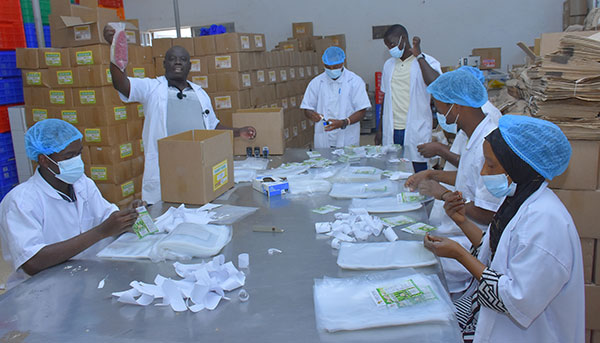
Entebbe, Uganda | Patricia Akankwatsa | In Uganda, where farming is the heart of the economy, entrepreneur Nsabimana Elie is showing how valuable it is to transform local crops into new products. He started his food processing company, MIECA, in 2018. Through MIECA, Nsabimana has not only become a champion for Uganda’s organic goods but has also successfully entered international markets.
MIECA’s journey began with a focus on one of Uganda’s most cherished staples: matooke. Recognizing the high demand for this product abroad, the company started with a simple but powerful mission to process Matoke for export. That initial step was a masterstroke, and the product line has since blossomed to include more than 70 items, including sweet potato, cassava, maize, and other local foods. All of these are transformed into high-quality, export-ready goods. Notably, MIECA has been a pioneer in introducing Ugandan matooke to a global audience, showcasing the country’s diverse agricultural wealth.
“We saw a gap in the market for high-quality, organic Ugandan products,” Nsabimana said.
“We wanted to be the ones to fill it, to show the world what our country has to offer.”
The company’s expansion has been nothing short of remarkable. From its humble beginnings in a rented space in Kawuku, MIECA’s products can now be found across the globe. The company has a strong presence in major Canadian cities like Vancouver, Calgary, and Montreal. In the United States, it has a footprint in all 50 states, while in Europe, its products are stocked in France and Belgium. The Middle East is covered by a large stock in Oman and a strategic office in Deira, Dubai, serving the entire region. Even Australia has not been left out, with MIECA products available in Adelaide, Perth, and Melbourne.
“Our goal was always to think big,” Nsabimana stated.
“We wanted to build a company that was not just a local success story but a global one. It’s a challenge, but we believe in the quality of our products and the hard work of our team.”


Despite its international success, MIECA faces significant hurdles. The company’s current production, which averages 100 containers per year, is weak and cannot keep up with the high demand for its organic products. Furthermore, like many businesses in a landlocked country, MIECA grapples with high transportation costs. Shipping goods from Uganda to the port of Mombasa significantly increases the final price of its products, making it challenging to compete with rivals from West Africa.
However, Nsabimana’s strategy is not to compete on price alone but to leverage the company’s key strengths: quality and organic integrity. While many of its West African competitors are known for poor packaging and quality, and others from countries like Vietnam, China, and India rely on chemical fertilizers to boost output, MIECA’s products stand out as being authentically organic and of the highest quality. This commitment to a superior product is its competitive advantage in the international market.
The company’s boldest move yet is its self-funded investment in a new, state-of-the-art factory.
The new facility, being built on a 20-acre site in Buwama is expected to become the largest food processing factory in East Africa. This project, funded entirely by MIECA’s own resources without any external loans, is a testament to the founder’s financial prudence and confidence in his business model. It is a calculated step to overcome production limitations and meet the burgeoning global demand.
“This new factory is a game-changer for us,” Nsabimana explained.
“It will allow us to scale our operations and meet the demand we’re currently missing out on. It’s an investment not just in MIECA but in the future of Ugandan agriculture.”
He believes that with sufficient government support, Matoke exports alone could double Uganda's foreign exchange earnings from coffee and tea combined.
MIECA is also playing a crucial role in addressing Uganda’s youth employment challenge. The company employs more than 500 people, primarily from the younger generation, providing formal, stable jobs that are essential for the country’s socio-economic development.
“We are more than just a business; we are a community,” Nsabimana said. “We want to empower young Ugandans, giving them the skills and opportunities to build a better future for themselves and their families.”
 The Independent Uganda: You get the Truth we Pay the Price
The Independent Uganda: You get the Truth we Pay the Price




Kindly take note the photos used are mine and I reserve the absolute Right over their use. This, I brought to the attention of the author.
Kindly pull them down and desist from future use of the same.